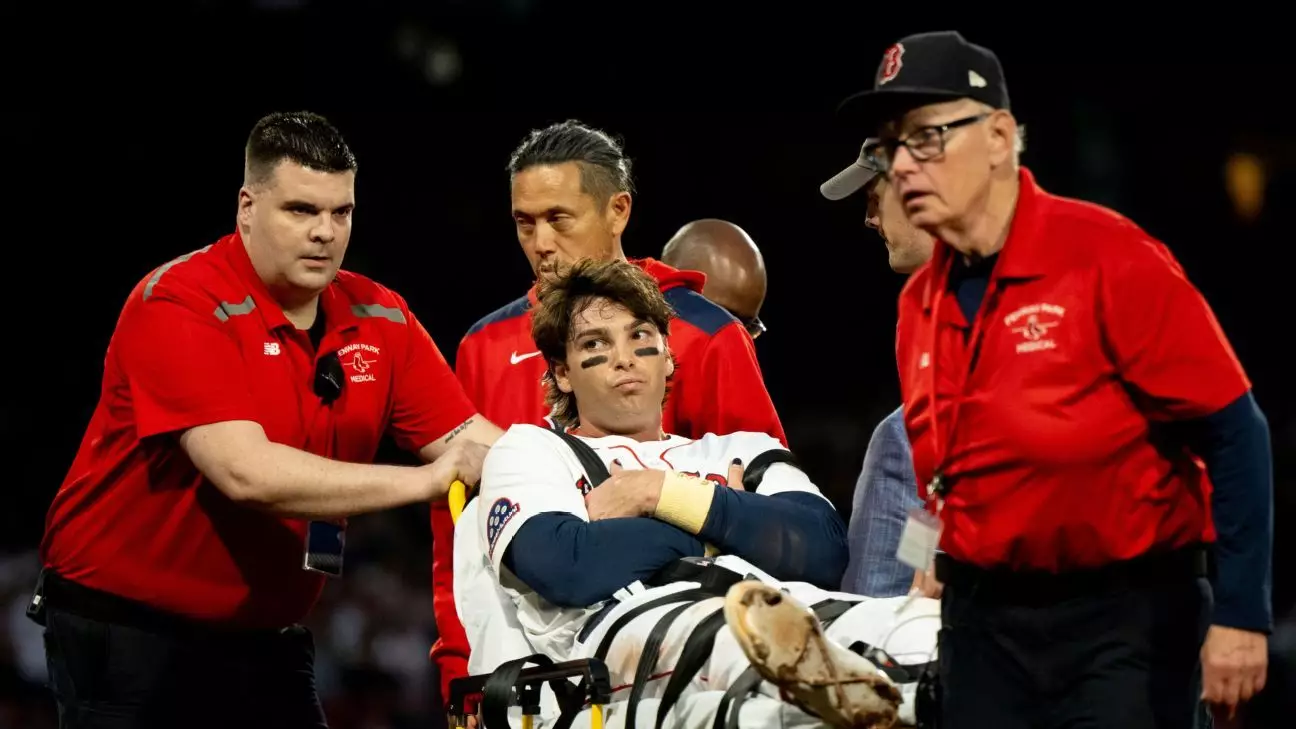In a shocking and unfortunate turn of events for the Boston Red Sox, first baseman Triston Casas has been sidelined for the remainder of the season due to a ruptured patellar tendon in his left knee. The injury occurred during a routine play as he was hustling to first base in a game against the Minnesota Twins. At just 25 years old, the promising young talent was showing signs of growth, making the news even more disheartening for both the organization and its fan base. Such incidents in sports not only affect the player and the team but also ripple through the entire community, highlighting the fragile nature of athletic careers.
The Impact of his Loss
Casas’ injury presents a substantial challenge for the Red Sox this season. Though his early-season statistics of a .182 batting average, three home runs, and eleven RBIs may not jump off the page, his potential remained a key asset for the team. Chief baseball officer Craig Breslow acknowledged that despite his slow start, the organization believed in his capability for growth and production. The loss of a player who was not only an offensive asset but a stabilizing presence on and off the field signifies a deeper issue—the Red Sox currently face a lack of depth in crucial positions. The dynamics of the clubhouse could shift dramatically as the team adapts to his absence.
From Hard Work to Heartbreak
The narrative surrounding Casas this season was one of determination. After experiencing an injury-laden previous season, the first baseman dedicated himself to making a comeback; however, his aspirations have abruptly hit a wall. Manager Alex Cora had emphasized how hard Casas worked during the offseason, indicating a high level of expectation for his performance. The player’s desire to be a consistent presence is now overshadowed by his need to focus on recovery. The irony of a player aiming for resilience and persistence in the game only to face such a devastating injury underscores the harsh realities athletes confront. It’s a reminder that no amount of effort can guarantee the desired outcome when it comes to sports.
Rehabilitation and Recovery: A New Journey
Following successful surgery to repair his left patellar tendon, Casas now embarks on a rehabilitation journey. As Cora noted in the wake of the injury, the focus should now shift towards recovery and setting the stage for a stronger return next season. Rehab can often be a mentally and physically taxing experience for athletes; they must wrestle with impatience while also remaining committed to their recovery plans. For Casas, who has been vocal about achieving a more relaxed approach at the plate, the focus will now shift away from competitive performance to the rigors of physical healing.
Future Considerations for the Team
The Red Sox are faced with critical decisions in the wake of Casas’ injury. The selection of infielder/outfielder Abraham Toro from Triple-A Worcester highlights the team’s immediate steps to address the gap left at first base. However, this could also serve as an opportunity for the organization to explore long-term options that can stabilize the position. Breslow mentioned that this situation might lead to exploring both internal options and potential external acquisitions. It’s a tactical moment, but it also reveals a deeper question about the team’s preparedness and resilience in facing injuries—an all-too-common aspect of sports life.
Community Reaction and Support
While the team continues to adapt, the support from fans, teammates, and the overall community plays a crucial role. The Red Sox organization has always prided itself on its close-knit culture, and the news of Casas’ injury has united fans in solidarity. There’s a collective hope that he will return stronger than ever, as resilience not only shapes individual players but also defines team spirit. Each injury tells a story, and in Casas’ journey, his resilience could serve as inspiration for both himself and his teammates. Such experiences often resonate beyond the field, becoming lessons in perseverance for fans and aspiring athletes alike.
Triston Casas’ journey is far from over; it’s simply entering a new chapter, one that demands patience and determination.

